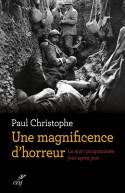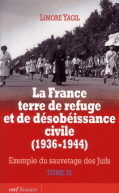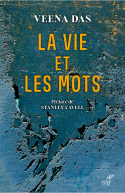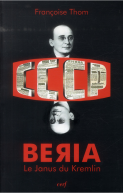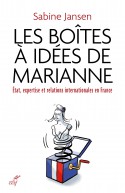
États-Unis, la métamorphose hispanique
Collection L'Histoire à vif
320 pages - oct. 2008
28,60€
Alors que les États-Unis s'interrogent sur leur identité, sur leur mission dans le monde, l'actualité a redonné tout son poids au facteur religieux qui, lentement mais sûrement, change le mode de vie et les croyances américaines. On a parlé de l'influence croissante des évangéliques, du fondamentalisme, du rôle persistant des sources puritaines, mais on évoque plus rarement l'impact du catholicisme véhiculé par l'immigration massive et durable en provenance d'Amérique latine. Dans l'Église catholique américaine, l'augmentation exponentielle du nombre de Latinos reste une question largement taboue. Or, les Latinos, conscients d'être l'avenir d'un catholicisme américain corseté par une religion civile homogénéisante et instrumentalisée, clament aussi être son salut. Ils sont en effet les premiers à s'emparer de sa doctrine sociale, plus contre-culturelle outre-Atlantique que nulle part ailleurs. Parmi eux, une aile militante a donné naissance à une théologie contextuelle très nouvelle qui décline de manière inédite certaines intuitions de la théologie de la libération, tout en s'en démarquant nettement. Les questions posées cette fois sont d'ordre anthropologique et culturel plus qu'économique : « Qu'est-ce que l'homme ? » Nous n'assistons pas à un choc frontal de deux cultures mais à un subtil mélange des genres dont les Latinos, héritiers de plusieurs métissages culturels, ont le secret. L'enjeu de cette lente métamorphose, c'est la réceptivité de l'Amérique à la différence et à la complexité, en son sein et tout autour d'elle, car de la nature du lien social aux États-Unis dépend le rapport que l'Amérique entretient avec le reste du monde. Ce n'est pas seulement un livre d'entretiens, mais un ouvrage engagé qui porte un regard chrétien sur notre culture occidentale, la mondialisation, l'évolution de nos sociétés. Ce sujet apparemment exotique est en réalité de nature à interroger le lecteur dans sa vie quotidienne, le lecteur chrétien en particulier, sur le rôle de la communauté dans l'acte de croire, sur l'héritage collectif à l'heure de l'individualisme triomphant, sur le sens de l'Église et sa mission.
--
At a time when the United States of America is questioning its identity and its mission in the world, recent events have shown that religion has emerged as a key factor, slowly but surely changing beliefs and the way of life in America. We have heard of the growing influence of the Evangelists, of fundamentalism, of ever-present puritan sources; but less frequently evoked is the impact of Catholicism, produced by the massive and lasting immigration from Latin America. The exponential increase in the number of Latinos in the Catholic Church of America remains largely a taboo. But the Latinos, aware that they represent the future of an American Catholicism today constricted by a homogenizing and instrumentalized civil religion, see themselves also as its salvation. They are the first people to take up its social doctrine, more culturally subversive in the US than in any other land. Among them, there is a militant stream which has given birth to a new contextual theology, interpreting certain intuitions of liberation theology in an original way while clearly marking their distance. The questions posed here are more anthropological and cultural than economical: ‘What is man?’ What we are witnessing is not a head-on clash between two cultures, but a subtle blending of genres. The Latinos, the product of several such cultural blends, know all the secrets. What is at stake in this slow metamorphosis is the receptivity of America to difference and complexity, within and outside its society; because the nature of the social bond in the United States depends on their relation with the rest of the world. This is not simply a book of interviews, but a militant work that takes a look, through Christian eyes, at our Western culture, globalization, the evolution of our societies. This seemingly exotic subject is, in reality, likely to interpolate readers in their daily life, especially Christian readers, making them reflect on the role of the community in the act of belief, our collective heritage in times of triumphant individualism, the meaning of the Church and its mission.
--
At a time when the United States of America is questioning its identity and its mission in the world, recent events have shown that religion has emerged as a key factor, slowly but surely changing beliefs and the way of life in America. We have heard of the growing influence of the Evangelists, of fundamentalism, of ever-present puritan sources; but less frequently evoked is the impact of Catholicism, produced by the massive and lasting immigration from Latin America. The exponential increase in the number of Latinos in the Catholic Church of America remains largely a taboo. But the Latinos, aware that they represent the future of an American Catholicism today constricted by a homogenizing and instrumentalized civil religion, see themselves also as its salvation. They are the first people to take up its social doctrine, more culturally subversive in the US than in any other land. Among them, there is a militant stream which has given birth to a new contextual theology, interpreting certain intuitions of liberation theology in an original way while clearly marking their distance. The questions posed here are more anthropological and cultural than economical: ‘What is man?’ What we are witnessing is not a head-on clash between two cultures, but a subtle blending of genres. The Latinos, the product of several such cultural blends, know all the secrets. What is at stake in this slow metamorphosis is the receptivity of America to difference and complexity, within and outside its society; because the nature of the social bond in the United States depends on their relation with the rest of the world. This is not simply a book of interviews, but a militant work that takes a look, through Christian eyes, at our Western culture, globalization, the evolution of our societies. This seemingly exotic subject is, in reality, likely to interpolate readers in their daily life, especially Christian readers, making them reflect on the role of the community in the act of belief, our collective heritage in times of triumphant individualism, the meaning of the Church and its mission.
- Dimensions : 135x215x24
- ISBN : 9782204084086
- Poids : 420 grammes
Avec la collaboration de : Pierre de Charentenay
DANS LA CATÉGORIE HISTOIRE GÉNÉRALE
Une affaire de famille
Jean XXIII, les juifs et les chrétiens
d' Alexandre Adler
136 pages - avril 2014
La France terre de refuge et de désobéissance civile (1936-1944). Tome 3
Exemple du sauvetage des juifs Tome III - Implication des milieux catholiques et protestants - L'a
de Limore Yagil
448 pages - nov. 2011

